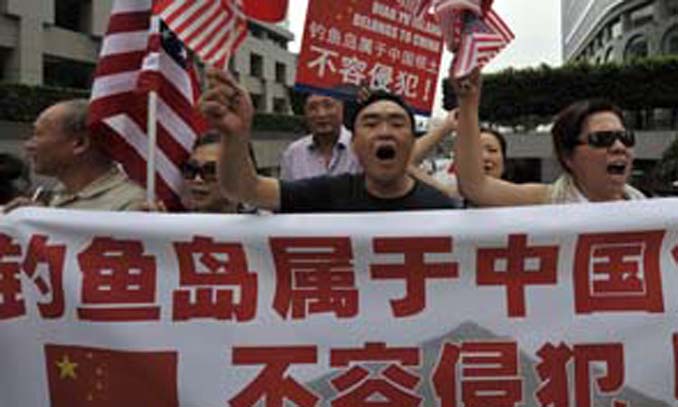A Chinese lawyer has filed a lawsuit against the Japanese government for violating Chinese sovereignty in its recent attempt to "purchase" the Diaoyu Islands, seeking an apology and confiscation of the money raised by Japanese politicians.
Hao Junbo, a lawyer at Lehman, Lee and Xu, headquartered in Beijing, told the Global Times on Monday that he has added Kunioki Kurihara, a Japanese businessman who claimed ownership of three of the Diaoyu Islands, to his list of defendants.
Lawyer sues Japan over Diaoyu bidA Chinese lawyer has filed a lawsuit against the Japanese government for violating Chinese sovereignty in its recent attempt to "purchase" the Diaoyu Islands, seeking an apology and confiscation of the money raised by Japanese politicians.
Tourist trips can stress sovereignty claimsI have recently submitted an application to the State Oceanic Administration (SOA) to lease the Diaoyu Islands for tourism development. Such a decision raised speculation that it was made in response to plans of the Japanese central government and the Tokyo metropolitan government to purchase the islands.
Tourism proposal for Diaoyu IslandsA Chinese entrepreneur has apparently upped the ante on some Japanese politicians by applying to the State Oceanic Administration (SOA) to rent the Diaoyu Islands in the East China Sea and develop them as a tourism center.
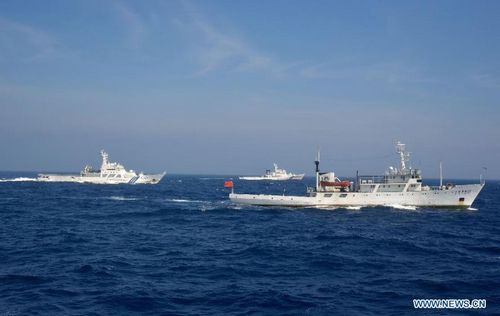 Lawyer sues Japan over Diaoyu bid Lawyer sues Japan over Diaoyu bid |
●Hao Junbo, a lawyer at Lehman, Lee and Xu, headquartered in Beijing
"I'm suing the Tokyo government, its governor and Kurihara because they are trying to legalize the ownership of the Diaoyu Islands by making the purchase a civil case which has the same theory as money laundering," Hao Junbo said, adding the point of his case is to let Chinese courts exercise their judicial rights over the Diaoyu Islands.
●Lu Yaodong, director of the Institute of Japanese Studies at the Chinese Academy of Social Sciences
"It has caused huge damage to bilateral relations and domestic communications. Disputes should be solved by dialogue not unilateral action and it is understandable that the Chinese public is fighting back over the violations."
|
Japan recalls Chinese ambassador over Diaoyu tensions
|
●Zhou Yongsheng, professor of China Foreign Affairs University
Japan's temporary recall just aims to get more fresh information about China's attitude under the current situation. Zhou said the recall also shows that Japanese government has to pay more attentions to China’s reactions now.
●Former director of the International Intelligence Office of Japan’s Foreign Ministry
The director says Japan’s claim to their sovereignty dates back to an 1895 decision by the Okinawa cabinet that the islands came under its jurisdiction. But according to Chinese history dating back to the 14th century, its military influence had already reached the territory.
|
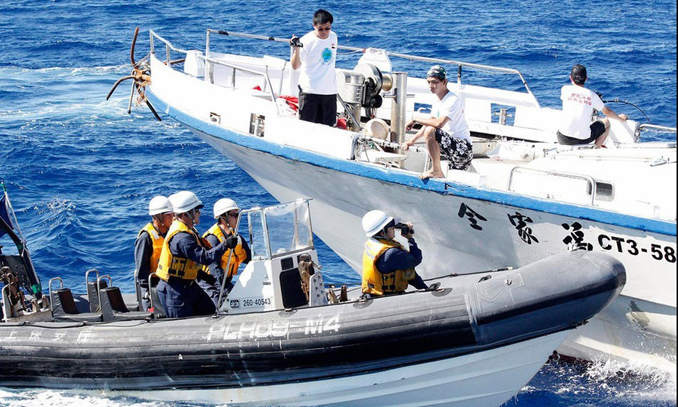
Taiwan backs Diaoyu activists as mainland urges Japanese restraint |
●Sun Yingchun, a professor at the Communication University of China
These actions from Taiwan might deter Japan from coveting our territory, and it would also alleviate the relations across the Taiwan Straits, promoting cooperation between the mainland and Taiwan.
●Yoshifumi Nakai, professor of the Department of Political Studies at Gakushuin University in Japan
Whenever Japan mentions the Diaoyu Islands dispute, many from the Chinese mainland, Taiwan and Hong Kong tend to unite to protest against the Japanese over the issue. Having authorities across the Taiwan Straits work together to fight Japan over the islands is what concerns Japan most.
|
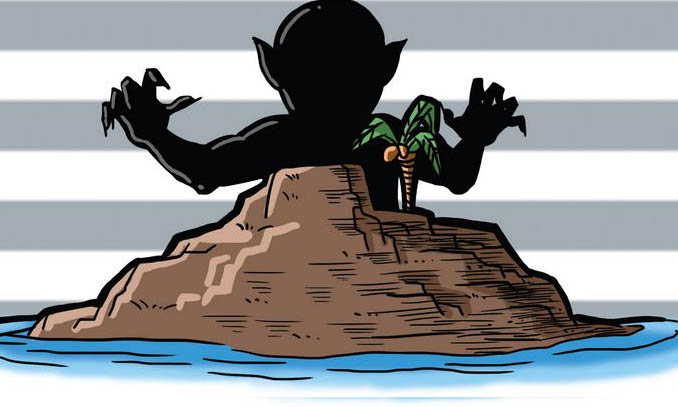
Diaoyu Islands can't be 'bought': FM spokesman
|
●China's Foreign Ministry spokesman Liu Weimin said that the Chinese government will continue to take necessary measures to resolutely safeguard the sovereign rights of the Diaoyu Islands and adjacent islets.
●Ma Ying-jeou, the incumbent Taiwan leader said that Taiwan government insists Diaoyu Islands are parts of China.
|
| Time |
|
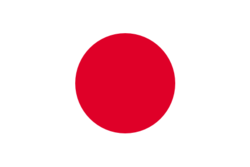 |
April 16
|
|
Tokyo governor Shintaro Ishihara said that the metropolitan government plans to buy the Diaoyu Islands in the East China Sea, over which both China and Japan claim sovereignty, a move that risks elevating tensions between the two countries. |
| April 17 |
China reiterated that the Diaoyu Islands and other affiliated isles have been an inherent part of Chinese territory since ancient times, and China holds indisputable sovereignty over them. |
|
| April 27 |
|
Ishihara announced that the metropolitan government had set up an account for people to send money to help it purchase the Diaoyu Islands in the East China Sea, the Japan Times reported. |
May 2
|
China's fishery administration authorities confirmed that two of its vessels have sailed into waters near the Diaoyu Islands in the East China Sea.
|
|
May 8
|
The Chinese foreign ministry said that it held the same stance toward unilateral action from Japan in its bid to violate China's lawful ownership of these islands.
|
The Tokyo metropolitan government went further in its plan to purchase three of the Diaoyu Islands, announcing that total donations had reached over 200 million yen ($2.5 million) by May 7.
|
May 16
|
China and Japan held a high-level consultation on maritime affairs with the Diaoyu Islands taking center stage.
|
May 18
|
|
World Uyghur Congress head Rebiya Kadeer made a donation of 100,000 yen ($125) on Friday to Takeo Hiranuma, a member of parliament and the party representative of the Sunrise Party of Japan, after the meeting of the WUC assembly, and declared that she would help the Tokyo metropolitan government "buy" the Diaoyu Islands.
|
May 22
|
The Chinese government voiced strong protest against the meeting.
|
Members of the Democratic Party of Japan (DPJ) reportedly held a meeting to discuss the purchase of the Diaoyu Islands, after councilors were split over the proposal by Tokyo mayor Shintaro Ishihara.
|
June 7
|
|
A senior Japanese cabinet official said that the Japanese government was studying the proposal by a right-wing politician to purchase the Diaoyu Islands and that objections to the plan by the Japanese envoy to China was "not in line with the government's stance," according to the Kyodo News. |
June 18
|
Experts say Taiwan-based Foxconn CEO Terry Gou's suggestion that he would buy the Diaoyu Islands and cooperate with Japan to develop them is impracticable and meaningless.
|
|
June 26
|
China again requested Japan to stop causing new disturbances over the Diaoyu Islands and safeguard the overall interests of bilateral ties.
|
|
July 7
|
China will not allow its territory to be "purchased" by anyone, a Chinese Foreign Ministry spokesman said, after Japan said that it was looking to buy disputed islands from a Japanese citizen.
|
Japanese Prime Minister Yoshihiko Noda admitted his government was negotiating with a "private owner" to "nationalize" part of the "Senkaku Islands" (China's Diaoyu Islands) by the end of the year.
|
July 11
|
Three Chinese fishery patrol ships arrived at areas near the Diaoyu Islands around 2 am on July 11 during a routine check, according to fishery authorities.
|
|
July 15
|
|
Japan's ambassador to China Uichiro Niwa returns to Tokyo on July 15 to discuss how Japan should respond to recent developments concerning the disputed Diaoyu Islands in the East China Sea. Japan recalls Chinese ambassador over Diaoyu tensions.
|
July 18
|
A Chinese lawyer named Hao Junbo has filed a lawsuit against the Japanese government on July 18 for violating Chinese sovereignty in its recent attempt to "purchase" the Diaoyu Islands, seeking an apology and confiscation of the money raised by Japanese politicians.
|
|
July 23
|
Hao Junbo, a lawyer at Lehman, Lee and Xu, headquartered in Beijing has added Tokyo government, its governor and Kunioki Kurihara, a Japanese businessman who claimed ownership of three of the Diaoyu Islands, to his list of defendants.
|
|
Source: Global Times-Xinhua
1.
Lawyer sues Japan over Diaoyu bidA shipload of the US military's latest Osprey transport aircraft arrived in Japan on Monday amid Japanese protests over safety issues, according to AP. Analysts say the move shows Japan's intention to strengthen surveillance over the East China Sea and South China Sea and its alliance with the US.
2.
Private deals between US, Japan concerning Diaoyu Islands "invalid": Chinese FMAccording to Japan's Kyodo News Agency, a senior US State Department official said on July 9 that the Diaoyu Islands (referred to as the Senkaku Islands in Japan) fall within the scope of Article 5 of the US-Japan Treaty of Mutual Cooperation and Security, as the Senkaku Islands have been under the administrative control of the government of Japan since they were returned as part of the reversion of Okinawa in 1972.
3.
Backing needed for political moderatesThe US-Japan military alliance functions smoothly and guarantees a bond of interest between the two nations, without being influenced by historical issues. The US adopts a pragmatic diplomatic policy, dealing out rewards and punishments as necessary.
4.
US-Japanese strategies put region at riskAt the end of April, the US and Japan reached a new agreement on the joint use of the US military bases in the Pacific region. According to media reports, the Japanese Self-Defense Forces are expected to station forces alongside US troops in the Philippines. Once Manila approves, Japan, the US and the Philippines will conduct specific military training together in Philippine bases.
5.
Japan’s tough Diaoyu position aimed at USIn December 2011, Japan and the US jointly held a military drill. Such military drills have been practiced for more than two decades, but this time the scale was unprecedented.
The reason was exactly the incident that happened in September. Japan and the US assumed that the waters near the Diaoyu Islands might be threatened by Chinese military forces, although in ordinary people's eyes a fishing boat barely represents a nation.

